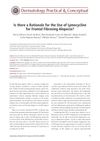 2 citations,
April 2019 in “Experimental Dermatology”
2 citations,
April 2019 in “Experimental Dermatology” The article concludes that studying how skin forms is key to understanding skin diseases and improving regenerative medicine.
 2 citations,
May 2017 in “InTech eBooks”
2 citations,
May 2017 in “InTech eBooks” Stem cells could improve hair growth and new treatments for baldness are being researched.
 1 citations,
May 2009 in “Wiley-Blackwell eBooks”
1 citations,
May 2009 in “Wiley-Blackwell eBooks” Early treatment of PCOS in teens is crucial to prevent long-term health issues like diabetes and heart disease.
 1 citations,
June 2023 in “Biomolecules & therapeutics”
1 citations,
June 2023 in “Biomolecules & therapeutics” Nitric oxide is important for skin functions and both helps protect against and contributes to skin inflammation and sensitization.
 1 citations,
January 2018 in “Stem cell biology and regenerative medicine”
1 citations,
January 2018 in “Stem cell biology and regenerative medicine” DNA methylation is essential for skin and hair follicle development, and could be a target for treating skin diseases.
 January 2019 in “Springer eBooks”
January 2019 in “Springer eBooks” PRP may help with hair loss and improve hair quality with few side effects, but more research is needed.
 November 2014 in “John Wiley & Sons, Ltd eBooks”
November 2014 in “John Wiley & Sons, Ltd eBooks” Eating high-glycemic and dairy foods can increase hormones that may cause acne and other health issues.
 August 2014 in “Journal of The American Academy of Dermatology”
August 2014 in “Journal of The American Academy of Dermatology” Obesity is linked to more severe hair loss in adult men and to excess hair growth, but its effects on hair conditions are complex and need more research.
 August 2024 in “IAHS Medical Journal”
August 2024 in “IAHS Medical Journal” Low vitamin D and ferritin levels are linked to female hair loss.
 April 2024 in “bioRxiv (Cold Spring Harbor Laboratory)”
April 2024 in “bioRxiv (Cold Spring Harbor Laboratory)” GRK2 is essential for healthy hair follicle function, and its absence can lead to hair loss and cysts.
 January 2024 in “Diabetes & metabolism journal”
January 2024 in “Diabetes & metabolism journal” Disrupting natural body clocks increases the risk of developing type 2 diabetes.
 January 2024 in “Dermatology practical & conceptual”
January 2024 in “Dermatology practical & conceptual” Lymecycline may help with Frontal Fibrosing Alopecia but needs more research.
 December 2023 in “bioRxiv (Cold Spring Harbor Laboratory)”
December 2023 in “bioRxiv (Cold Spring Harbor Laboratory)” AP-2α and AP-2β proteins are essential for healthy adult skin and hair.
 September 2023 in “Frontiers in medicine”
September 2023 in “Frontiers in medicine” The mTOR signaling pathway is crucial for hair health and targeting it may lead to new hair loss treatments.
 July 2022 in “Research Square (Research Square)”
July 2022 in “Research Square (Research Square)” Certain miRNAs may play a role in sheep hair follicle development, which could help improve wool production.
 September 2020 in “Journal of Investigative Medicine”
September 2020 in “Journal of Investigative Medicine” Omics techniques are needed to understand the scalp microbiome's role in alopecia areata for new treatments.
 April 2019 in “Journal of Investigative Dermatology”
April 2019 in “Journal of Investigative Dermatology” Women with scarring alopecia are less likely to have used hormone replacement therapy or oral contraceptives compared to those with female pattern hair loss.
 April 2019 in “Journal of Investigative Dermatology”
April 2019 in “Journal of Investigative Dermatology” Calcium signals and SHH guide the direction of feather growth in chicken skin.
 April 2019 in “Journal of Investigative Dermatology”
April 2019 in “Journal of Investigative Dermatology” Eating grape powder may reduce the severity of skin allergy symptoms.
 July 2018 in “Elsevier eBooks”
July 2018 in “Elsevier eBooks” Lichen Planopilaris is a hair loss condition best treated early with various medications, including hydroxychloroquine, to prevent permanent baldness.
 June 2018 in “Disease-a-Month”
June 2018 in “Disease-a-Month” Remove inflamed cysts surgically, avoid topical antibiotics on wounds, treat skin and mouth conditions with specific medications, and address underlying causes of hair loss.
 April 2018 in “bioRxiv (Cold Spring Harbor Laboratory)”
April 2018 in “bioRxiv (Cold Spring Harbor Laboratory)” Certain small molecules can help regrow hair by turning on the body's cell cleanup process.
 January 2017 in “Springer eBooks”
January 2017 in “Springer eBooks” Over 40% of postmenopausal women experience hair loss, with treatments aiming to stop further loss and possibly thicken hair.
 August 2016 in “Journal of Investigative Dermatology”
August 2016 in “Journal of Investigative Dermatology” The enzyme CD73 helps control human hair growth and could be targeted to treat hair growth disorders.
 August 2016 in “Journal of Investigative Dermatology”
August 2016 in “Journal of Investigative Dermatology” Blocking the CCR5 receptor may be a new way to treat hair loss from alopecia areata.
 August 2016 in “Journal of Investigative Dermatology”
August 2016 in “Journal of Investigative Dermatology” Human hair follicles have a scent receptor that can influence hair growth.
 1514 citations,
December 2011 in “Fertility and sterility”
1514 citations,
December 2011 in “Fertility and sterility” Experts agree that PCOS affects women's health in complex ways, but more research is needed to understand and treat it effectively.
 1265 citations,
October 2013 in “The Journal of Clinical Endocrinology and Metabolism”
1265 citations,
October 2013 in “The Journal of Clinical Endocrinology and Metabolism” The guideline suggests using specific criteria to diagnose PCOS, recommends various treatments for its symptoms, and advises screening for related health issues.
 991 citations,
January 2011 in “Nature Reviews Endocrinology”
991 citations,
January 2011 in “Nature Reviews Endocrinology” The document concludes that PCOS is a complex disorder caused by both genetic and environmental factors, affecting women's health in various ways, and requires personalized treatment.
 883 citations,
August 2016 in “Nature Reviews Disease Primers”
883 citations,
August 2016 in “Nature Reviews Disease Primers” Polycystic Ovary Syndrome (PCOS) is a common condition in women that can cause metabolic, reproductive, and psychological issues, and requires lifestyle changes and medication for management.






























